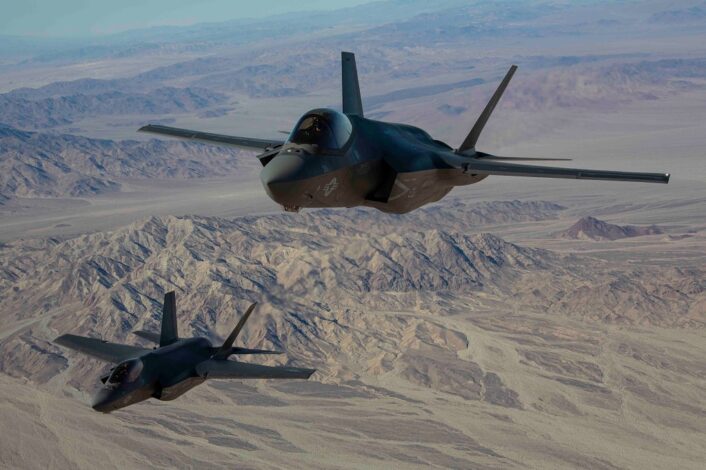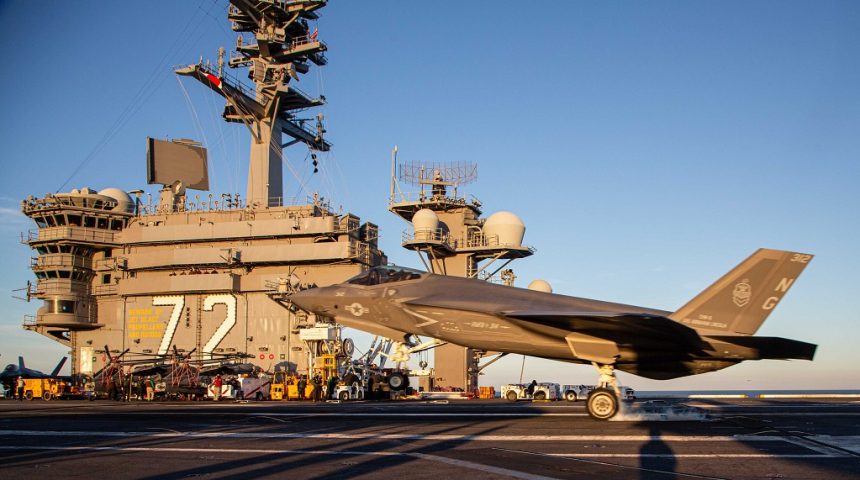Marine Fighter Attack Squadron 314 of 3rd Marine Aircraft Wing becomes the first Marine squadron to deploy the F-35C on an aircraft carrier.
The F-35C Lightning II of the U.S. Marine Corps reached yet another milestone, with the type leaving for the first operational deployment aboard an aircraft carrier. The F-35s of Marine Fighter Attack Squadron 314 “Black Knights”, part of the 3rd Marine Aircraft Wing, arrived on the USS Abraham Lincoln (CVN 72) on January 3, 2022, together with the other squadrons assigned to Carrier Air Wing Nine. The USS Lincoln is leaving San Diego with Carrier Strike Group 3 to head for the Pacific Ocean.
“The Black Knight’s deployment of F-35C Lightning II aboard USS Abraham Lincoln is the newest chapter in the Marine Corps’ long history of naval integration,” said Maj. Gen. Bradford J. Gering, 3rd MAW commanding general. The upcoming deployment represents years of hard work and innovation by the Marines and Sailors of VMFA-314, MAG-11, and 3rd MAW. It also reinforces our commitment to fielding the most lethal and ready Navy-Marine Corps force as we project warfighting capabilities throughout the Indo-Pacific region, or globally wherever our nation calls.”
The Marines consider the capability to deploy operationally the F-35C significant as it was specifically built for aircraft carrier operations, as well as enhancing the battlespace awareness of all aircraft in the Carrier Air Wing, contributing to a flexible, mobile force that expands the US military advantage at sea. This is especially true in a contested maritime region like the Pacific Ocean, where the presence of the 5th gen fighter aircraft might contribute to the regional stability while providing security for the US and allies.
“Our ability to operate the F-35C in the Pacific greatly increases the Marine Corps’ naval expeditionary force capabilities by providing us the capacity to employ the most advanced electronic warfare capabilities on any aircraft today in support of fleet operations,” said Lt. Col. Brendan M. Walsh, VMFA-314 commanding officer. “In addition, having this asset available greatly increases the Marine Corps’ ability to provide security to our allied nations and preserve a free and open Indo-Pacific.”
The 3rd MAW has also demonstrated the F-35’s long-range aerial maritime strike capabilities last summer during Exercise Summer Fury 21. During the exercise, which is the largest Marine aviation exercise on the West Coast, the Wing’s F/A-18C Hornets and F-35s flew from Marine Corps Air Station (MCAS) Miramar to Washington State, a distance of more than one thousand miles, to deliver long-range precision fires on a simulated enemy naval surface combatant in a distributed, maritime environment.

“The Summer Fury long-range strike is an opportunity for 3rd MAW to execute a maritime strike against an enemy surface combatant while being supported by an aerial-delivered forward arming and refueling point,” said Lt. Col. Duncan A. French, 3rd MAW lead operations planner. “The concepts and tasks inherent in this mission are critical to the success of a fight against a peer adversary.”
The first operational deployment of the F-35C comes as a culminating effort as VMFA-314 completed its workups last year with Carrier Air Wing Nine on board the USS Abraham Lincoln. The last step off the workups saw VMFA-314 completing their final integrated training cycle along other elements of Carrier Strike Group Three in December as the Marine Corps continues to develop its 5th Generation strike fighter capabilities.
The development of the USMC’s is 5th Generation strike fighter capabilities to meet the demands of the rapidly evolving future operating environment is still ongoing, as VMFA-314 became the first squadron in the Marine Corps to declare the Full Operational Capability (FOC) for the F-35C Lightning II in July 2021. VMFA-314 was the first Marine Corps squadron to transition to the F-35C variant of the Joint Strike Fighter after retiring its legacy F/A-18A/C aircraft and receiving its first F-35C in January 2020 from Naval Air Station Lemoore and declared the Initial Operational Capability (IOC) by the end of the year.
The Abraham Lincoln Combat Strike Group is led by the command staff of CSG 3 and consists of the Nimitz-class aircraft carrier USS Abraham Lincoln, Carrier Air Wing 9, the guided-missile cruiser USS Mobile Bay (CG 53) and the guided-missile destroyers of Destroyer Squadron 21 (DESRON 21) – USS Fitzgerald (DDG 62), USS Gridley (DDG 101), USS Sampson (DDG 102) and USS Spruance (DDG 111). This is also the first time in the U.S. Navy history that a woman, Capt. Amy Bauernschmidt, has been assigned the command of an aircraft carrier and will lead it on an operational deployment.
The Carrier Air Wing Nine includes eight squadrons: Marine Fighter Attack Squadron (VMFA) 314 “Black Knights”, flying F-35Cs; Strike Fighter Squadron (VFA) 14 “Tophatters” and Strike Fighter Squadron (VFA) 151 “Vigilantes”, flying F/A-18E Super Hornets; Strike Fighter Squadron (VFA) 41 “Black Aces”, flying F/A-18F Super Hornets; Electronic Attack Squadron (VAQ) 133 “Wizards”, flying EA-18G Growlers; Airborne Command & Control Squadron (VAW) 117 “Wallbangers”, flying E-2D Hawkeyes; Helicopter Sea Combat Squadron (HSC) 14 “Chargers”, flying MH-60S Knight Hawks Helicopter Maritime Strike Squadron (HSM) 71 “Raptors”, flying MH-60R Sea Hawks.









